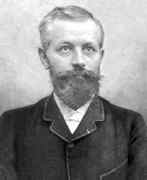Person: Tannery, Paul

Paul Tannery was a French mathematician who was famous as an historian of mathematics.
Mathematical Profile (Excerpt):
- Since Paul Tannery is famous as an historian of mathematics it is particularly fitting that we should give details of his life and work in this archive dedicated to the history of mathematics.
- Paul Tannery's parents were Delphin Tannery, who was an engineer working for the French railways, and Opportune Perrier.
- Delphin Tannery's job with the railways involved him moving around the country depending on where railways were being constructed.
- His parents who were very keen to see their sons achieve great things with their education so they were delighted when, after completing his secondary education in 1860, Tannery sat the entrance examinations in science for the École Polytechnique.
- It was in this period after he graduated the Tannery became interested in the positivist philosophy of Comte.
- Tannery was much influenced by Comte's philosophy and it would influence his work throughout his life.
- Tannery worked from 1865 to 1867 in the state tobacco factory at Lille before moving to Paris to an administrative post in the administration of the state tobacco industry.
- Tannery, a staunch French patriot, served in the French army as an artillery captain.
- Tannery was present during the siege, and was dismayed when Paris surrendered on 28 January 1871.
- Tannery refused to acknowledge the terms of this treaty.
- Sent to Périgord to help with the construction of buildings, Tannery became ill.
- Sent to Bordeaux in 1874, again to help with construction work, Tannery found there friends and university facilities which allowed him to spend all his free time working on the history of mathematics in ancient cultures.
- Although many other historians of science have been obliged to conduct their research concurrently with their professional activities, none of them seems to have produced a body of work comparable to Tannery's in scope and importance.
- In 1877 Tannery made the rather strange move of requesting a move to Le Havre.
- She was 13 years younger than he was and, had relatively little education but, after Tannery's death, she would undertake the difficult task of preparing a complete publication of his works with remarkable skill.
- By 1883 Tannery was finding the academic isolation of Le Havre too much to bear and he applied for a transfer to Paris.
- From 1886 until 1888 Tannery was in Tonneins and, deprived of library and other resources, he was unable to carry out any serious work on the history of mathematics except editorial work.
- Tannery was named as the first choice to fill the post by the two consultative bodies.
- So certain was Tannery that his appointment after that was merely a formality, that he started work on writing his inaugural lecture..
- It seems that the government did not want a Roman Catholic for the post and also preferred the course proposed by the other candidate on contemporary science rather than Tannery's proposed course on the history of science.
- It did not escape the notice of Tannery, his friends, and his international colleagues that a course on the history of science seemed appropriate for a professor of the history of science.
- Tannery did work of great importance as an editor of famous mathematics texts.
- Tannery became so skilled in using Greek numerals in his historical work that he believed that they had certain advantages over our present system.
- the detailed studies that constituted the bulk of his output were, in Tannery's view, only a necessary stage in the elaboration on much broader syntheses that would ultimately lead to a comprehensive history of science that he himself could openly initiate.
Born 20 December 1843, Mantes-la-Jolie, Yvelines, France. Died 27 November 1904, Pantin, Seine-St Denis, France.
View full biography at MacTutor
Tags relevant for this person:
Ancient Greek, Ancient Indian, Astronomy, Geometry, Puzzles And Problems
Thank you to the contributors under CC BY-SA 4.0! 

- Github:
-

- non-Github:
- @J-J-O'Connor
- @E-F-Robertson
References
Adapted from other CC BY-SA 4.0 Sources:
- O’Connor, John J; Robertson, Edmund F: MacTutor History of Mathematics Archive
